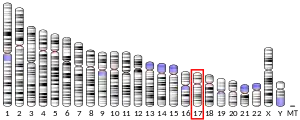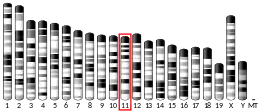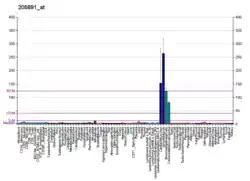Adenosine A2B receptor
The adenosine A2B receptor, also known as ADORA2B, is a G-protein coupled adenosine receptor, and also denotes the human adenosine A2b receptor gene which encodes it.[5]
Mechanism
This integral membrane protein stimulates adenylate cyclase activity in the presence of adenosine. This protein also interacts with netrin-1, which is involved in axon elongation.
Gene
The gene is located near the Smith-Magenis syndrome region on chromosome 17.[5]
Ligands
Research into selective A2B ligands has lagged somewhat behind the development of ligands for the other three adenosine receptor subtypes, but a number of A2B-selective compounds have now been developed,[6][7][8][9][10][11][12][13][14][15] and research into their potential therapeutic applications is ongoing.[16][17][18][19][20][21][22]
Agonists
- BAY 60-6583
- NECA (N-ethylcarboxamidoadenosine)
- (S)-PHPNECA - high affinity and efficacy at A2B, but poor selectivity over other adenosine receptor subtypes
- LUF-5835
- LUF-5845 - partial agonist
Antagonists and inverse agonists
- Compound 38:[23] antagonist, high affinity and good subtype selectivity
- ISAM-R56A:[22] non-xanthinic high affinity selective antagonist (Ki: 1.50 nM)
- ISAM-140:[24] non-xanthinic selective antagonist (Ki = 3.49 nM).
- ISAM-R324A:[25] Soluble and metabolically stable non-xanthinic selective antagonist (Ki = 6.10 nM).
- ATL-801
- CVT-6883
- MRS-1706
- MRS-1754
- OSIP-339,391
- PSB-603: xanthinic antagonist
- PSB-0788: xanthinic antagonist
- PSB-1115: xanthinic antagonist
- PSB-1901:[26] xanthinic antagonist with picomolar potency
References
- GRCh38: Ensembl release 89: ENSG00000170425 - Ensembl, May 2017
- GRCm38: Ensembl release 89: ENSMUSG00000018500 - Ensembl, May 2017
- "Human PubMed Reference:". National Center for Biotechnology Information, U.S. National Library of Medicine.
- "Mouse PubMed Reference:". National Center for Biotechnology Information, U.S. National Library of Medicine.
- "Entrez Gene: ADORA2B adenosine A2b receptor".
- Volpini R, Costanzi S, Lambertucci C, Taffi S, Vittori S, Klotz KN, Cristalli G (July 2002). "N(6)-alkyl-2-alkynyl derivatives of adenosine as potent and selective agonists at the human adenosine A(3) receptor and a starting point for searching A(2B) ligands". Journal of Medicinal Chemistry. 45 (15): 3271–3279. doi:10.1021/jm0109762. PMID 12109910.
- Volpini R, Costanzi S, Lambertucci C, Vittori S, Cristalli G (2002). "Purine nucleosides bearing 1-alkynyl chains as adenosine receptor agonists". Current Pharmaceutical Design. 8 (26): 2285–2298. doi:10.2174/1381612023392856. PMID 12369946. Archived from the original on 2013-04-14.
- Baraldi PG, Tabrizi MA, Preti D, Bovero A, Romagnoli R, Fruttarolo F, et al. (March 2004). "Design, synthesis, and biological evaluation of new 8-heterocyclic xanthine derivatives as highly potent and selective human A2B adenosine receptor antagonists". Journal of Medicinal Chemistry. 47 (6): 1434–1447. doi:10.1021/jm0309654. PMID 14998332.
- Cacciari B, Pastorin G, Bolcato C, Spalluto G, Bacilieri M, Moro S (December 2005). "A2B adenosine receptor antagonists: recent developments". Mini Reviews in Medicinal Chemistry. 5 (12): 1053–1060. doi:10.2174/138955705774933374. PMID 16375751. Archived from the original on 2013-04-14.
- Baraldi PG, Romagnoli R, Preti D, Fruttarolo F, Carrion MD, Tabrizi MA (2006). "Ligands for A2B adenosine receptor subtype". Current Medicinal Chemistry. 13 (28): 3467–3482. doi:10.2174/092986706779010306. PMID 17168717. Archived from the original on 2013-04-14.
- Beukers MW, Meurs I, Ijzerman AP (September 2006). "Structure-affinity relationships of adenosine A2B receptor ligands". Medicinal Research Reviews. 26 (5): 667–698. doi:10.1002/med.20069. PMID 16847822. S2CID 24390495.
- Elzein E, Kalla R, Li X, Perry T, Parkhill E, Palle V, et al. (January 2006). "Novel 1,3-dipropyl-8-(1-heteroarylmethyl-1H-pyrazol-4-yl)-xanthine derivatives as high affinity and selective A2B adenosine receptor antagonists". Bioorganic & Medicinal Chemistry Letters. 16 (2): 302–306. doi:10.1016/j.bmcl.2005.10.002. PMID 16275090.
- Carotti A, Cadavid MI, Centeno NB, Esteve C, Loza MI, Martinez A, et al. (January 2006). "Design, synthesis, and structure-activity relationships of 1-,3-,8-, and 9-substituted-9-deazaxanthines at the human A2B adenosine receptor". Journal of Medicinal Chemistry. 49 (1): 282–299. doi:10.1021/jm0506221. PMID 16392813.
- Tabrizi MA, Baraldi PG, Preti D, Romagnoli R, Saponaro G, Baraldi S, et al. (March 2008). "1,3-Dipropyl-8-(1-phenylacetamide-1H-pyrazol-3-yl)-xanthine derivatives as highly potent and selective human A(2B) adenosine receptor antagonists". Bioorganic & Medicinal Chemistry. 16 (5): 2419–2430. doi:10.1016/j.bmc.2007.11.058. PMID 18077171.
- Stefanachi A, Brea JM, Cadavid MI, Centeno NB, Esteve C, Loza MI, et al. (March 2008). "1-, 3- and 8-substituted-9-deazaxanthines as potent and selective antagonists at the human A2B adenosine receptor". Bioorganic & Medicinal Chemistry. 16 (6): 2852–2869. doi:10.1016/j.bmc.2008.01.002. PMID 18226909.
- Volpini R, Costanzi S, Vittori S, Cristalli G, Klotz KN (2003). "Medicinal chemistry and pharmacology of A2B adenosine receptors". Current Topics in Medicinal Chemistry. 3 (4): 427–443. doi:10.2174/1568026033392264. PMID 12570760. Archived from the original on 2013-04-14.
- Gao ZG, Jacobson KA (September 2007). "Emerging adenosine receptor agonists". Expert Opinion on Emerging Drugs. 12 (3): 479–492. doi:10.1517/14728214.12.3.479. PMID 17874974. S2CID 13777846.
- Kolachala V, Ruble B, Vijay-Kumar M, Wang L, Mwangi S, Figler H, et al. (September 2008). "Blockade of adenosine A2B receptors ameliorates murine colitis". British Journal of Pharmacology. 155 (1): 127–137. doi:10.1038/bjp.2008.227. PMC 2440087. PMID 18536750.
- Haskó G, Linden J, Cronstein B, Pacher P (September 2008). "Adenosine receptors: therapeutic aspects for inflammatory and immune diseases". Nature Reviews. Drug Discovery. 7 (9): 759–770. doi:10.1038/nrd2638. PMC 2568887. PMID 18758473.
- Ham J, Rees DA (December 2008). "The adenosine a2b receptor: its role in inflammation". Endocrine, Metabolic & Immune Disorders Drug Targets. 8 (4): 244–254. doi:10.2174/187153008786848303. PMID 19075778. Archived from the original on 2013-04-14.
- Kim MO, Kim MH, Lee SH, Suh HN, Lee YJ, Lee MY, Han HJ (June 2009). "5'-N-ethylcarboxamide induces IL-6 expression via MAPKs and NF-kappaB activation through Akt, Ca(2+)/PKC, cAMP signaling pathways in mouse embryonic stem cells". Journal of Cellular Physiology. 219 (3): 752–759. doi:10.1002/jcp.21721. PMID 19194991. S2CID 11066973.
- Tay AH, Prieto-Díaz R, Neo S, Tong L, Chen X, Carannante V, et al. (May 2022). "A2B adenosine receptor antagonists rescue lymphocyte activity in adenosine-producing patient-derived cancer models". Journal for Immunotherapy of Cancer. 10 (5): e004592. doi:10.1136/jitc-2022-004592. PMC 9115112. PMID 35580926.
- Stefanachi A, Nicolotti O, Leonetti F, Cellamare S, Campagna F, Loza MI, et al. (November 2008). "1,3-Dialkyl-8-(hetero)aryl-9-OH-9-deazaxanthines as potent A2B adenosine receptor antagonists: design, synthesis, structure-affinity and structure-selectivity relationships". Bioorganic & Medicinal Chemistry. 16 (22): 9780–9789. doi:10.1016/j.bmc.2008.09.067. PMID 18938084.
- El Maatougui A, Azuaje J, González-Gómez M, Miguez G, Crespo A, Carbajales C, et al. (March 2016). "Discovery of Potent and Highly Selective A2B Adenosine Receptor Antagonist Chemotypes". Journal of Medicinal Chemistry. 59 (5): 1967–1983. doi:10.1021/acs.jmedchem.5b01586. PMID 26824742.
- Prieto-Díaz R, González-Gómez M, Fojo-Carballo H, Azuaje J, El Maatougui A, Majellaro M, et al. (December 2022). "Exploring the Effect of Halogenation in a Series of Potent and Selective A2B Adenosine Receptor Antagonists". Journal of Medicinal Chemistry: acs.jmedchem.2c01768. doi:10.1021/acs.jmedchem.2c01768. PMC 9841532. PMID 36517209.
- Jiang J, Seel CJ, Temirak A, Namasivayam V, Arridu A, Schabikowski J, et al. (April 2019). "A2B Adenosine Receptor Antagonists with Picomolar Potency". Journal of Medicinal Chemistry. 62 (8): 4032–4055. doi:10.1021/acs.jmedchem.9b00071. PMID 30835463. S2CID 73472174.
Further reading
- Stiles GL (April 1992). "Adenosine receptors". The Journal of Biological Chemistry. 267 (10): 6451–6454. doi:10.1016/S0021-9258(19)50445-8. PMID 1551861.
- Pierce KD, Furlong TJ, Selbie LA, Shine J (August 1992). "Molecular cloning and expression of an adenosine A2b receptor from human brain". Biochemical and Biophysical Research Communications. 187 (1): 86–93. doi:10.1016/S0006-291X(05)81462-7. PMID 1325798.
- Li Q, Han X, Lan X, Hong X, Li Q, Gao Y, et al. (December 2017). "Inhibition of tPA-induced hemorrhagic transformation involves adenosine A2b receptor activation after cerebral ischemia". Neurobiology of Disease. 108: 173–182. doi:10.1016/j.nbd.2017.08.011. PMC 5675803. PMID 28830843.
- Jacobson MA, Johnson RG, Luneau CJ, Salvatore CA (May 1995). "Cloning and chromosomal localization of the human A2b adenosine receptor gene (ADORA2B) and its pseudogene". Genomics. 27 (2): 374–376. doi:10.1006/geno.1995.1061. PMID 7558011.
- Townsend-Nicholson A, Baker E, Sutherland GR, Schofield PR (January 1995). "Localization of the adenosine A2b receptor subtype gene (ADORA2B) to chromosome 17p11.2-p12 by FISH and PCR screening of somatic cell hybrids". Genomics. 25 (2): 605–607. doi:10.1016/0888-7543(95)80074-V. PMID 7790006.
- Strohmeier GR, Reppert SM, Lencer WI, Madara JL (February 1995). "The A2b adenosine receptor mediates cAMP responses to adenosine receptor agonists in human intestinal epithelia". The Journal of Biological Chemistry. 270 (5): 2387–2394. doi:10.1074/jbc.270.5.2387. PMID 7836474.
- Feoktistov I, Murray JJ, Biaggioni I (June 1994). "Positive modulation of intracellular Ca2+ levels by adenosine A2b receptors, prostacyclin, and prostaglandin E1 via a cholera toxin-sensitive mechanism in human erythroleukemia cells". Molecular Pharmacology. 45 (6): 1160–1167. PMID 8022409.
- Mirabet M, Herrera C, Cordero OJ, Mallol J, Lluis C, Franco R (February 1999). "Expression of A2B adenosine receptors in human lymphocytes: their role in T cell activation". Journal of Cell Science. 112 ( Pt 4) (4): 491–502. doi:10.1242/jcs.112.4.491. PMID 9914161.
- Feoktistov I, Goldstein AE, Biaggioni I (April 1999). "Role of p38 mitogen-activated protein kinase and extracellular signal-regulated protein kinase kinase in adenosine A2B receptor-mediated interleukin-8 production in human mast cells". Molecular Pharmacology. 55 (4): 726–734. PMID 10101031.
- Corset V, Nguyen-Ba-Charvet KT, Forcet C, Moyse E, Chédotal A, Mehlen P (October 2000). "Netrin-1-mediated axon outgrowth and cAMP production requires interaction with adenosine A2b receptor". Nature. 407 (6805): 747–750. Bibcode:2000Natur.407..747C. doi:10.1038/35037600. PMID 11048721. S2CID 4423128.
- Herrera C, Casadó V, Ciruela F, Schofield P, Mallol J, Lluis C, Franco R (January 2001). "Adenosine A2B receptors behave as an alternative anchoring protein for cell surface adenosine deaminase in lymphocytes and cultured cells". Molecular Pharmacology. 59 (1): 127–134. doi:10.1124/mol.59.1.127. PMID 11125033.
- Christofi FL, Zhang H, Yu JG, Guzman J, Xue J, Kim M, et al. (October 2001). "Differential gene expression of adenosine A1, A2a, A2b, and A3 receptors in the human enteric nervous system". The Journal of Comparative Neurology. 439 (1): 46–64. doi:10.1002/cne.1334. PMID 11579381. S2CID 46222306.
- Hayallah AM, Sandoval-Ramírez J, Reith U, Schobert U, Preiss B, Schumacher B, et al. (March 2002). "1,8-disubstituted xanthine derivatives: synthesis of potent A2B-selective adenosine receptor antagonists". Journal of Medicinal Chemistry. 45 (7): 1500–1510. doi:10.1021/jm011049y. PMID 11906291.
- Sitaraman SV, Wang L, Wong M, Bruewer M, Hobert M, Yun CH, et al. (September 2002). "The adenosine 2b receptor is recruited to the plasma membrane and associates with E3KARP and Ezrin upon agonist stimulation". The Journal of Biological Chemistry. 277 (36): 33188–33195. doi:10.1074/jbc.M202522200. PMID 12080047.
- Feoktistov I, Ryzhov S, Goldstein AE, Biaggioni I (March 2003). "Mast cell-mediated stimulation of angiogenesis: cooperative interaction between A2B and A3 adenosine receptors". Circulation Research. 92 (5): 485–492. doi:10.1161/01.RES.0000061572.10929.2D. PMID 12600879.
- Eltzschig HK, Ibla JC, Furuta GT, Leonard MO, Jacobson KA, Enjyoji K, et al. (September 2003). "Coordinated adenine nucleotide phosphohydrolysis and nucleoside signaling in posthypoxic endothelium: role of ectonucleotidases and adenosine A2B receptors". The Journal of Experimental Medicine. 198 (5): 783–796. doi:10.1084/jem.20030891. PMC 2194189. PMID 12939345.
- Ryzhov S, Goldstein AE, Matafonov A, Zeng D, Biaggioni I, Feoktistov I (June 2004). "Adenosine-activated mast cells induce IgE synthesis by B lymphocytes: an A2B-mediated process involving Th2 cytokines IL-4 and IL-13 with implications for asthma". Journal of Immunology. 172 (12): 7726–7733. doi:10.4049/jimmunol.172.12.7726. PMID 15187156.
- Kolachala V, Asamoah V, Wang L, Srinivasan S, Merlin D, Sitaraman SV (February 2005). "Interferon-gamma down-regulates adenosine 2b receptor-mediated signaling and short circuit current in the intestinal epithelia by inhibiting the expression of adenylate cyclase". The Journal of Biological Chemistry. 280 (6): 4048–4057. doi:10.1074/jbc.M409577200. PMID 15550390.
External links
- "Adenosine Receptors: A2B". IUPHAR Database of Receptors and Ion Channels. International Union of Basic and Clinical Pharmacology. Archived from the original on 2016-03-03. Retrieved 2008-11-25.
- Human ADORA2B genome location and ADORA2B gene details page in the UCSC Genome Browser.




